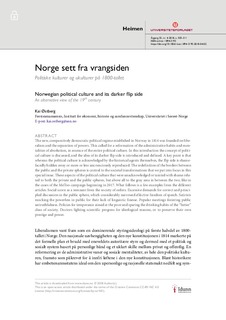| dc.contributor.author | Østberg, Kai Peter | |
| dc.date.accessioned | 2019-01-17T11:34:18Z | |
| dc.date.available | 2019-01-17T11:34:18Z | |
| dc.date.created | 2018-12-06T11:42:22Z | |
| dc.date.issued | 2018 | |
| dc.identifier.citation | Heimen - Lokal og regional historie. 2018, 55 (4), 303-311. | nb_NO |
| dc.identifier.issn | 0017-9841 | |
| dc.identifier.uri | http://hdl.handle.net/11250/2581048 | |
| dc.description | This is an open access article distributed under the terms of the Creative Commons CC-BY-NC 4.0 License | nb_NO |
| dc.description.abstract | The new, comparatively democratic political regime established in Norway in 1814 was founded on liberalism and the separation of powers. This called for a reformation of the administrative habits and mentalities of absolutism, in essence of the entire political culture. In this introduction the concept of political culture is discussed, and the idea of its darker flip side is introduced and defined. A key point is that whereas the political culture is acknowledged by the historical agents themselves, the flip side is shamefacedly hidden away or more or less unconsciously reproduced. The redefinition of the borders between the public and the private spheres is central to the societal transformations that we put into focus in this special issue. These aspects of the political culture that were unacknowledged or tainted with shame related to both the private and the public spheres, but above all to the gray area in between the two, like in the cases of the MeToo-campaign beginning in 2017. What follows is a few examples from the different articles: Social scorn as a remnant from the society of orders. Excessive demands for correct and principled discussion in the public sphere, which considerably narrowed effective freedom of speech. Satirists mocking the powerless in public for their lack of linguistic finesse. Popular meetings fostering public untruthfulness. Policies for temperance aimed at the poor and sparing the drinking habits of the “better” class of society. Doctors fighting scientific progress for ideological reasons, or to preserve their own prestige and power. | nb_NO |
| dc.language.iso | nob | nb_NO |
| dc.rights | Navngivelse-Ikkekommersiell 4.0 Internasjonal | * |
| dc.rights.uri | http://creativecommons.org/licenses/by-nc/4.0/deed.no | * |
| dc.title | Norge sett fra vrangsiden Politiske kulturer og ukulturer på 1800-tallet | nb_NO |
| dc.type | Journal article | nb_NO |
| dc.type | Peer reviewed | nb_NO |
| dc.description.version | publishedVersion | nb_NO |
| dc.rights.holder | © 2018 Author(s). | nb_NO |
| dc.source.pagenumber | 303-311 | nb_NO |
| dc.source.volume | 55 | nb_NO |
| dc.source.journal | Heimen - Lokal og regional historie | nb_NO |
| dc.source.issue | 4 | nb_NO |
| dc.identifier.doi | 10.18261/issn.1894-3195-2018-04-02 | |
| dc.identifier.cristin | 1639826 | |
| cristin.unitcode | 222,57,4,0 | |
| cristin.unitname | Institutt for økonomi, historie og samfunnsvitenskap | |
| cristin.ispublished | true | |
| cristin.fulltext | original | |
| cristin.qualitycode | 1 | |

